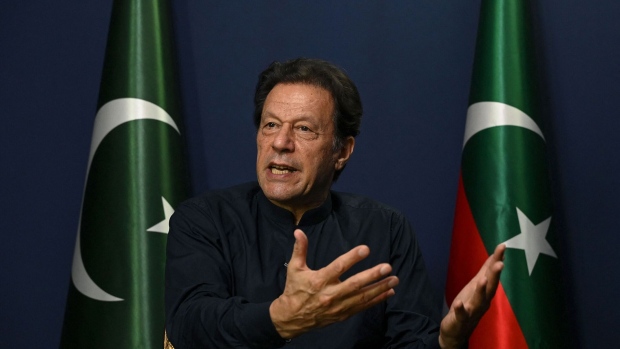May 29, 2023
Imran Khan Summoned Over Attacks on Pakistan Military Buildings
, Bloomberg News

(Bloomberg) -- Imran Khan has been summoned by Pakistan authorities to face questioning over the outbreak of violence that followed his brief detention earlier this month in which military buildings were attacked, as pressure mounts on the former premier amid a crackdown on his party and supporters.
The probe focuses on an attack on the Lahore Corps Commander’s house in central Punjab province, known as Jinnah House, a historical building and military residence that was set alight and damaged in the unrest that broke out after Khan’s arrest on corruption charges.
The 70-year-old politician was issued a notice from Lahore’s deputy inspector general of police, requiring him to appear for questioning at 4 p.m. local time Tuesday. Khan decided not to attend because of security concerns but asked the investigators to visit his residence or send questions for a written response, according to his lawyer Intazar Hussain Panjhuta.
Khan is under attack from all sides over claims his supporters were responsible for damaging military and state property. The army has said those responsible will be tried under military law, as the political crisis engulfing Khan, the government and the powerful military continues to escalate even as the country’s economic situation deteriorates.
Khan has condemned the Jinnah House assault, saying it brought ‘disgrace’ to the country, and has denied his party workers were responsible for the May 9 violence. He’s facing increasing challenges as his senior leaders quit in droves, thousands of his supporters have been detained around the country, and he continues to battle dozens of legal cases — all of which he denies.
A close aide to Khan told Bloomberg the government is just trying to “annoy and trouble him again and again.” Zulfi Bukhari said in a message that dialog is what is needed and is “the only way to save Pakistan from further economic turmoil.”
In a further sign of the widening chasm between the country’s political rivals, Prime Minister Shehbaz Sharif seemed to rule out any immediate chance of talks, saying in a tweet Tuesday afternoon there could be no dialog with those who “attack the symbols of the State.”
Pakistan’s military had earlier issued a statement also indirectly appearing to target Khan, saying those who try to “drive a wedge” between the nation’s citizens and armed forces won’t succeed.
“The nexus between the internal collusive elements and external forces to create instability has amply been exposed to the people of Pakistan,” the Chief of Army Staff, General Syed Asim Munir, said during a visit to the Quetta Garrison, according to the military’s media wing.
Khan has, in the past, accused certain senior army officials of orchestrating his removal from power more than a year ago and being behind an alleged assassination attempt, which they have denied. Pakistan has been directly ruled by the army for almost half of its modern history and most prime ministers, including Khan, have depended on the institution’s support to stay in power.
Pakistan’s economy remains in deep distress. The latest data showed growth slowing sharply to one of the lowest levels in its history, amid record inflation and interest rates, as the country struggles to revive a crucial International Monetary Fund bailout.
The IMF said it’s working with the government to try to reach a decision on the resumption of the stalled funding program before it expires at the end of June. The two sides have not been able to break the impasse for more than six months. The lender is also taking note of “recent political developments,” said Nathan Porter, IMF mission chief for Pakistan, in a statement late Monday.
“While we do not comment on domestic politics, we do hope that a peaceful way forward is found in line with the Constitution and the rule of law,” he said.
--With assistance from Kamran Haider.
(Updates with Khan not attending in third paragraph)
©2023 Bloomberg L.P.






